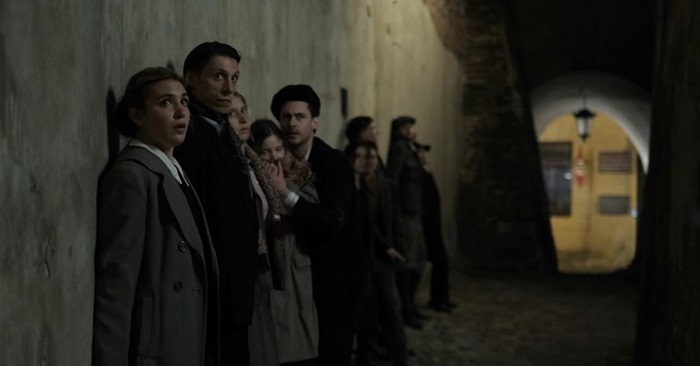Movie Info
Movie Info
- Director
- Louise Archambault
- Run Time
- 2 hours and 1 minute
- Rating
- Not Rated
VP Content Ratings
- Violence
- 2/10
- Language
- 1/10
- Sex & Nudity
- 2/10
- Star Rating
Relevant Quotes
Give justice to the weak and the orphan;
maintain the right of the lowly and the destitute.
Rescue the weak and the needy;
deliver them from the hand of the wicked.”

Director Louise Archambault brings us our second film this month dealing with a rescuer during the Holocaust. The script is by Dan Gordon, based on his Broadway play focusing on the young Polish nurse Irena Gut Opdyke. Like One Life, it is a heartening example of what one well-lived life can accomplish.
Irena (Sophie Nélisse) is a religious young woman, 19 years-old when the Nazis invaded Poland. When she sees a Nazi stomp a Jewish baby to death while taunting its mother, she is both horrified and determined to help them especially as she overhears Nazi officers talking about Jews. This soon comes when she is taken from a factory job and selected to work by Major Rugemer (Dougray Scott) in the officer’s mess. She picks up from the Germans’ conversations news about which streets the Nazis will be clearing of Jews next. SS officer “Rokita” (Maciek Nawrocki) is surprised to find no Jews living there.
She comes into direct contact with about a dozen Jews when Major Rugemer chooses her the housekeeper at a villa he has taken over from its deported Jewish owners. The owners had built a secret room in the basement, into which Irena sneaks a dozen Jews in danger of being sent to a camp. The Major wants to post an orderly as her assistant, but Irena manages to convince him to let her try to prepare a lavish meal for his guests by herself. There are some semi-comical scenes with the Jews working in the basement to prepare the courses while Irena runs up and down the stair, serving the crowd cocktails and entrées and then the multicourse dinner itself. The Major is amazed at her ability to keep his large dinner party provisioned.
There are lots of problems, even a would-be blackmailer threatening to turn her in. One of the hidden women is pregnant, but when she and her fellow Jews talk about an abortion, Irena, ever the devout Catholic, opposes it with a strong anti-abortion speech. (We must remember this film was made with the support of the Polish government. This might also explain why at the beginning of the film there is no mention that Irena lived under Soviet control for almost two years before the Nazis betrayed their ally and took over the whole nation when Hitler turned against his Soviet ally.)
It is amazing that Irena gets away with hiding so many fugitives for as long as she does, but eventually Major Rugemer does become aware of their presence. He is furious with Irena, but also stuck in a dilemma. He knows the Gestapo will hold him responsible, so he strikes a deal with the reluctant housekeeper, she agreeing to be his mistress.
There are more exciting events, but this is enough to show that this young Polish woman’s story provides a new wrinkle on the rescuing the Jews genre. It is no spoiler to reveal that Irena survived the War and Soviet charges of collaborating with the Nazis. She married and settled into family life with no public recognition of her courageous service until 1975 when she heard a neo-Nazi state that the Holocaust never happened. She began to speak out about her experience, putting it into book form– In My Hands. Memories of a Holocaust Rescuer. Yad Vashem honored her in 1982 as one of the Polish Righteous Among the Nations, and subsequently many other honors came her way, including an episode of ABC’s Primetime Live in 1995.
Most Holocaust film reviews include a note about the importance of remembering lest we repeat the tragedy—unfortunately with the rise of antisemitic incidents in this country and Europe, some of them amounting to hate crimes, we still need this. Antisemitism is not only the oldest but seemingly the most persistent of prejudices to darken the human mind and soul. This too is a good film, though probably not for children below middle-school age—the baby stomping is not shown, but there is no mistaking what the Nazi officer is doing. He even shoots the wailing mother with his pistol.
This review will be in the April issue of VP along with a set of questions for reflection and/or discussion. If you have found reviews on this site helpful, please consider purchasing a subscription or individual issue in The Store

